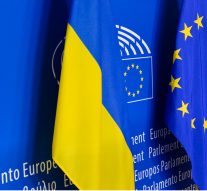
Conflict in Ukraine: the economic consequences for the European Union
Economy 12 March 2022Estimated time of reading: ~ 4 minutes
Russian military attacks on Ukraine have been going on for three weeks. Such crisis is affecting the economy of all parties involved in the armed conflict, including the European Union as Ukraine’s first neighbor.
Inflation in the European Union is rising, as well as energy and raw material prices; it will be difficult to avoid a decline in production and consumption, which is why stagflation is a threat – according to several agencies, economic growth is zero when inflation is present.
Such judgments by EU economists coincide with French President Emmanuel Macron’s warning that „history is coming“ to Europe, and that the crisis in Ukraine is „into an even harsher phase“. After meetings with Russian President Vladimir Putin, Macron claimed it was „more than a foreshadowing“. Putin assured Macron that Russia would continue without hesitation to „demilitarize” Ukraine, remove „Nazi forces“, and establish a neutral status for the country. Economic experts predict that harsh Western sanctions will have economic and social ramifications for Russia and the European Union, while Macron, whose nation now holds the EU chair, stated enterprises, people, and ordinary life will be „under deep transformation in the coming months“.
According to the French finance minister, the EU will fight a thorough economic and financial war against Russia. Paris’s identification of Russians with assets in France have been sanctioned by the EU for ties to Russian authorities in connection with Moscow’s ongoing special campaign to „demilitarize and denationalize“ Ukraine. „The EU will launch an all-out „economic and financial war“ against Russia“, said Bruno Le Mer, France’s finance minister. According to Le Mer, Russia’s economy will collaps due to the full force of sanctions imposed by the European Union and the United States.
The EU Council of Ministers has requested „emergency measures“ to save livestock and other European agriculture, which has been hit by a sharp increase in cereal and oilseed prices on the global market, owing to disruptions in exports from Russia and Ukraine, from which the Union imports significant amounts of cereals. According to a review in the French newspaper “Figaro“, Europe is „faced with the unknowns of a more expensive world“, and prominent analysts point out that central banks are faced with a „cruel choice“ between stopping inflation by raising interest rates and thus preventing falling consumption, or keeping production low. „Russia’s invasion of Ukraine will cause economic and political changes in Europe“, according to the Economist Intelligence Unit (EIU) in London.
The Economist Group’s think tank states that „economic sanctions against Russia will still have a limited impact, but that the uncertainty of prolonging the war will inevitably affect investment and consumption, while the rise in world raw material prices will encourage already high inflation and supply chain disruptions“ The Economist Intelligence Unit’s warns that „Europe is in danger of running out of Russian gas if Moscow turns off the tap in retaliation for sanctions, to face a massive influx of Ukrainian refugees and a massive financial market disruption and trade disruption“. The German site Eurointelligence points to the fact that Moscow, despite the war, did not cut off the supply of gas to Europe through Ukraine, that payments for gas, despite sanctions, continue through Sberbank and Gazprom Bank, the two largest Russian, due to a huge jump in gas prices. It brings big profits to Russia, but Europe has nowhere to go because it cannot survive without Russian gas.
It remains to be seen what the outcome of the crisis will be, but the European Union will certainly not remain immune to what happened in eastern Ukraine in late February and early March. Member states are already reducing their economic growth projections, but it is believed that the consequences will be longer than planned.
Written by: Nenad Stekić


